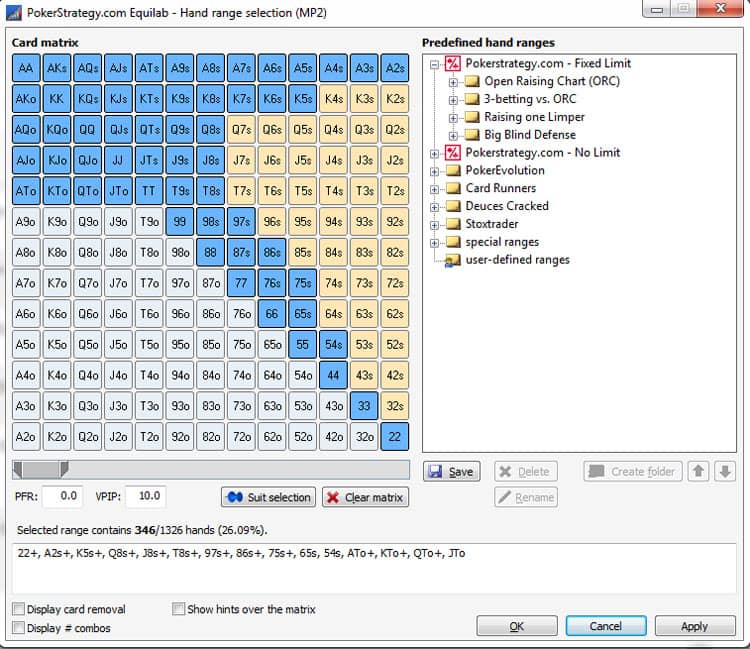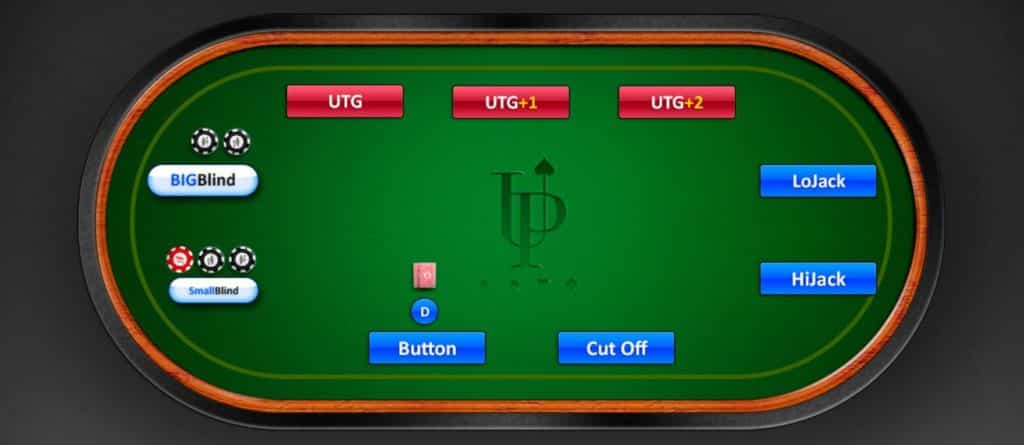Poker Table Positions Lojack
Cut-off is the second best position at the poker table to play your starting hands from after the dealer’s position, because if an opponent on the button will decide not to participate in a hand, you will act the last in all betting rounds. Cut-off and button are the perfect positions for stealing the blinds, because not a lot of opponents. Cut-off is the second best position at the poker table to play your starting hands from after the dealer’s position, because if an opponent on the button will decide not to participate in a hand, you will act the last in all betting rounds. Cut-off and button are the perfect positions for stealing the blinds, because not a lot of opponents. Position 1 is the first person to act. In a no-blind game this is the person to the left of the dealer. In a game with one or more blinds, this is the first person to have a choice of acting (fold, call, raise). Poker positioning is a big reason why the seating arrangement at a table can be so important. It is much better not to have strong, difficult players on your left and in position on you for most. Position 1 is the first person to act. In a no-blind game this is the person to the left of the dealer. In a game with one or more blinds, this is the first person to have a choice of acting (fold, call, raise).
Lesson 4:
Position is important for players to understand the actions taken by other players and accordingly make the move. It is a way of calculating who all may have a strong hand and who all may not. For eg. If players before you simply call, then it mostly implies that they have average cards or just want to see the other community cards first. The reasons could vary player to player but it is for you to analyse & then act.
An “out of position” player (who acts first in a hand) plays the same hand differently from when he plays “in position”.
Obviously more the players before you, the more you benefit in getting a better picture. This is exactly why later positions are favoured in poker instead of the early positions. But the dealer button keeps on shifting so everyone has to go through all the positions.
Let’s just see what the different positions are called and how to usually play in each.
Positions at a 6-max poker table: Small Blind, Big Blind, Under The Gun, Middle Position, Cut-off, Dealer.
Positions at a 9-max poker table: Small Blind, Big Blind, Under The Gun, UTG+1, UTG+2, Middle Position, Hijack, Cut-off, Dealer.
Dealer
The game starts with dealing hole cards to everyone on the table, starting from the player on the left of the dealer button player. The dealer button player is the last to act in all rounds post-flop. The dealer button moves clockwise after every hand and the player who puts the small blind in a hand becomes the dealer in the next hand.
Early position (EP) - Players at the Early Position are the initial ones to act in the betting round. The player on the immediate left of the dealer button posts small blind and the next player posts big blind. Before the flop round, the players sitting left of the big blind (Under The Gun) starts the action and players at UTG+1 and UTG+2 act second and third respectively. As the players in the early position act before everyone, other players can figure out their strength by their moves. EP is considered an unfavourable position to play in majority of the situations as there is no idea of how the opponents are going to act after. So play in this position mostly when you have strong cards.
Middle position (MP) - MP players are those who act after the early position players. Players at this position can see the actions of EP players and take a calculated decision based on their observation. It is still not the best position as the late position players can ruin the strategies of MP players by making an unexpected move. If EP players fold their cards, MP players become Early Position players. If Late Position players quit the game before making a bet, MP players become the LP players.
Late position (LP) - LP (Hijack, cutoff, and button) is considered as the most favorable position on the game table. LP players can observe the actions (bet sizes, playing style) of EP and MP players and get valuable information about their hand strength. Because of this positional advantage, they can play a wide range of hands.
Now that you are aware about the basics here’s a quick summary on how to play poker.
Basic Strategy:Tips : Position : Starting Hands : Bluffing : Betting : Money Management
Your position at the poker table will often be more important than the cards that you are dealt... seriously. You will find that the outcome of every hand will be largely dependent on the position of each of the players at the table.
So, I think its pretty important that we learn about the importance of position before the next time we play a hand. You will never look at a hand in the same way again...
What is table position in Texas Hold'em?
If you take a close look at an online poker table, you will notice that the dealer button moves to the left after every hand. This allows for each player to put an equal amount of blinds into the pot as the game is played through each rotation of the dealer button. In addition to this, the dealer button changes the order of which players are going to act on each betting round.
If you are to the left of the button (i.e. in the blinds or just to the left of those), you will be one of the first players to act on the flop, turn and river, and there will be a number of players acting after you. Conversely, if you are on the button or just to the right of it, you will be one of the last players to act, as the majority of the other players at the table will have to make their plays before you.
Why is table position in Texas Hold'em important?
Table position is important because it is going to be incredibly useful to be able to act after our opponents. If we are the last to act on a hand, we can see whether our opponents have checked or bet before us, whereas we would not have this sort of information on our opponents if we were acting before them. The actions of our opponents is going to help us a lot, as it gives us a strong indication of the strength of their hand.

Texas Hold'em position example.
Lets say we are up against one opponent on the flop and we have not managed to improve our hand. If our opponent checks to us, we stand a good chance of being able to run a successful bluff, because we can infer from their check that they are weak by not wanting to bet out. However, if we were the first to act we would have no idea of whether they are strong or weak, because we have not had the opportunity to see what action they are going to take.
You really want to try and avoid playing hands from early position, that is unless your hand really is too good to fold.
That was a pretty basic example, but the theory can be applied to almost every situation in poker. So if you can see why position is important from this example alone, you have already come a long way in developing your game.
Playing hands depending on your position.
As a general rule:
You need a stronger hand to play out of position than you do when you are playing in position.
So basically, if you are going to be one of the first to act on each betting round, you will want to stick to playing premium hands like:

- AA
- KK
- AK
- AQ
- JJ
However, if you have good table position and you are going to be one of the last to act on each round, you can comfortably open up your starting hand range to include the following hands (along with the hands listed above, and assuming that there hasn't been too much action before you):
- AT
- KJ
- TT
- 99
This is all because of the fact that being out of position is going to be quite a big problem, and it is going to make the hand a lot more difficult to play. Therefore you will want to give yourself a much better opportunity to win the hand by only the playing better cards, and avoiding the ones that are likely to get you into trouble.
You can find out more about choosing the best starting hands in the starting hand strategy article, which should be your next stop on the strategy tour anyway.
General Texas Hold'em table position tips.
The big and small blind seats are horrible.
Poker Table Positions Lojack Number
Don't be fooled by the blinds! You may be one of the last to act before the flop, but for every betting round after that, you will either always be first or second to act. So make sure that you stick to playing the best cards in these seats and throw away any marginal hands. You will want to look throw away the vast majority of your hands in these seats as they will lose you money more often than not.
The button is awesome.
The button is the best seat in the hand. If you are on the button, you can guarantee that you will be the last to act on every betting round after the flop. This doesn't mean that you should play anything and everything from the button, but you can really open up your starting hand requirements to get in on the action from such a great seat.
You should be playing a lot more hands from the button than you should from early position.
Middle position is okay.
Middle position is in the middle between the good and bad seats, funnily enough. When you are in middle position you will want to keep an eye on whether players have limped in or raised before you, because you could either end up being one of the first or last to act on each round depending on which players decide to see the flop. The less players acting after you, the better your position becomes.
Texas Hold'em position overview.
Poker Table Position Names
Every time you play a hand in Texas Hold'em (or any other poker variant for that matter), you should always take into consideration your position relative to the dealer button. You may well be surprised at how much of an influence your position at the table can have on the outcome of a hand, so don't just look at your cards the next time you decide whether or not to play your hand.
If you are familiar with the principles behind table position, you may want to take it up another level by having a look at the article on relative position.
Go back to the sublime Texas Hold'em guide.
Can You Afford Not To Use
Poker Tracker 4?
“I wouldn’t play another session of online poker without it”
“I play $25NL, and in under 1 week PT4 had paid for itself”
Poker Table Positions Lojack Reviews
Comments